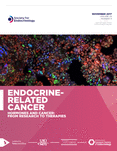Diabetes and pancreatic cancer
- YunFeng Cui1,2,* and
- Dana K Andersen1,*
- Department of Surgery, Johns Hopkins Bayview Medical Center, Johns Hopkins University School of Medicine, Baltimore, Maryland, USA
1Department of Surgery, Nankai Clinical School of Medicine, Tianjin Nankai Hospital, Tianjin Medical University, Tianjin, China
- (Correspondence should be addressed to D K Andersen who is now at Division of Digestive Diseases and Nutrition, National Institute of Diabetes and Digestive and Kidney Diseases, National Institutes of Health, Building DEM2, Room 659, 6707 Democracy Boulevard, Bethesda, Maryland 20892, USA; Email: andersendk{at}niddk.nih.gov)
Abstract
Epidemiological studies clearly indicate that the risk of pancreatic cancer (PC) is increased in diabetic patients, but most studies focus on overall diabetes or type 2 diabetes mellitus (T2DM), and there are few studies on the risks of type 1 and type 3c (secondary) diabetes. Possible mechanisms for increased cancer risk in diabetes include cellular proliferative effects of hyperglycemia, hyperinsulinemia, and abnormalities in insulin/IGF receptor pathways. Recently, insulin and insulin secretagogues have been observed to increase the PC risk, while metformin treatment reduces the cancer risk in diabetic subjects. In addition, anticancer drugs used to treat PC may either cause diabetes or worsen coexisting diabetes. T3cDM has emerged as a major subset of diabetes and may have the highest risk of pancreatic carcinoma especially in patients with chronic pancreatitis. T3cDM is also a consequence of PC in at least 30% of patients. Distinguishing T3cDM from the more prevalent T2DM among new-onset diabetic patients can be aided by an assessment of clinical features and confirmed by finding a deficiency in postprandial pancreatic polypeptide release. In conclusion, diabetes and PC have a complex relationship that requires more clinical attention. The risk of developing PC can be reduced by aggressive prevention and treatment of T2DM and obesity and the prompt diagnosis of T3cDM may allow detection of a tumor at a potentially curable stage.
- Revision received 27 June 2012
- Accepted 26 July 2012
- Made available online as an Accepted Preprint 27 July 2012
- © 2012 Society for Endocrinology












